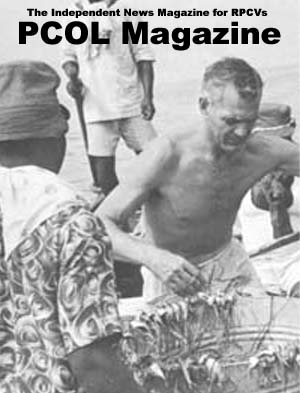
If the Peace Corps wishes to help in the fight against HIV/AIDS, it needs to send expertise, not just youthful zeal. That was what Ethiopian officials politely told Peace Corps country director Peter Parr when he approached them last summer with a proposal to send a batch of volunteers to work on the pandemic. "[HIV/AIDS] is serious business and requires serious people with commitment and capacity," says Meskele Lera, deputy director of the Ethiopian agency overseeing efforts to stop the spread of AIDS, who attended that first meeting with Mr. Parr. Despite Parr's best efforts, however, about half of his volunteers are straight out of college and still need to be told not to arrive at the office in flip-flops. But this may be changing. The Peace Corps is no longer just dispatching Americans abroad to teach English or help in the fields. It is tackling more complex issues, like HIV/AIDS and environmental degradation, which creates an impetus for the Peace Corps to professionalize. Now debate is brewing over how the agency can attract greater numbers of older, technically skilled volunteers. Those skilled volunteers may come from the droves of retiring baby boomers. The Peace Corps has already moved to welcome them, most recently under director Ronald Tschetter, who has tried to attract this demographic by making the medical screening less onerous, and by recruiting from both the AARP, and the retired teachers' association. The number of applications from people over 50 has risen by 60 percent since Mr. Tschetter began actively pursuing retirees in September, according to Joellen Duckett, a Peace Corps spokesperson. "You can't replace that experience," Tschetter said in an interview in Addis Ababa. "The same kind of passion that these young people have, these people have … but they have 30 years of experience to bring along with it."
Debate is brewing over how the Peace Corps can attract greater numbers of older, more experienced volunteers
World to Peace Corps: Skilled volunteers needed
Debate is brewing over how the agency can attract greater numbers of older, more experienced volunteers. One key target group: retiring baby boomers.
By Nicholas Benequista | Contributor to The Christian Science Monitor
from the April 25, 2008 edition
Correspondent Nicholas Benequista talks about a new and improved Peace Corps for Africa and the rest of the developing world.
Addis Ababa, Ethiopia - If the Peace Corps wishes to help in the fight against HIV/AIDS, it needs to send expertise, not just youthful zeal. That was what Ethiopian officials politely told Peace Corps country director Peter Parr when he approached them last summer with a proposal to send a batch of volunteers to work on the pandemic.
"[HIV/AIDS] is serious business and requires serious people with commitment and capacity," says Meskele Lera, deputy director of the Ethiopian agency overseeing efforts to stop the spread of AIDS, who attended that first meeting with Mr. Parr.
Despite Parr's best efforts, however, about half of his volunteers are straight out of college and still need to be told not to arrive at the office in flip-flops.
But this may be changing. The Peace Corps is no longer just dispatching Americans abroad to teach English or help in the fields. It is tackling more complex issues, like HIV/AIDS and environmental degradation, which creates an impetus for the Peace Corps to professionalize. Now debate is brewing over how the agency can attract greater numbers of older, technically skilled volunteers.
Those skilled volunteers may come from the droves of retiring baby boomers.
The Peace Corps has already moved to welcome them, most recently under director Ronald Tschetter, who has tried to attract this demographic by making the medical screening less onerous, and by recruiting from both the AARP, and the retired teachers' association. The number of applications from people over 50 has risen by 60 percent since Mr. Tschetter began actively pursuing retirees in September, according to Joellen Duckett, a Peace Corps spokesperson.
"You can't replace that experience," Tschetter said in an interview in Addis Ababa. "The same kind of passion that these young people have, these people have … but they have 30 years of experience to bring along with it."
These steps may not go far enough, according to Kevin Quigley, president of the National Peace Corps Association for former volunteers. Mr. Quigley advocates more drastic reform to attract older volunteers: breaking with the tradition of sending volunteers to the field for 27 months.
Quigley says he would be delighted to serve the Peace Corps again in Thailand, but, like many others, he cannot afford two years away from work. He envisions changes that would allow older professionals to travel to the field intermittently over the course of several years, while the rest of the time providing guidance to local partners via e-mail, phone, and Skype. Quigley says he has growing support among lawmakers for a significant reform of the Peace Corps in time for the agency's 50th anniversary in 2011.
"We absolutely are at a historic moment for the Peace Corps," says Quigley.
That historic moment has come later for the Peace Corps than for some of its counterparts. Once identical agencies from Japan and Britain have since overhauled their operations and re-focused their attention on making measurable contributions to development.
Japan's overseas volunteer program was incorporated about a decade ago into its international aid agency after receiving criticism that the program was more helpful to its volunteers than to the beneficiary countries. Now Japanese volunteers work alongside paid Japanese professionals.
"By integrating, we can put them into a better program," says Sadako Ogata, who heads Japan's overseas development agency. "It's not just volunteerism, as such, but volunteerism which can have more effect under different schemes."
Britain's Volunteer Services Overseas (VSO) now accepts volunteers of any nationality, and carefully vets applicants based on their experience and professional credentials. The average age of the VSO volunteer is 41, compared with 26 for the Peace Corps. VSO can be more selective in part because they send fewer volunteers abroad (they currently have about 1,500 volunteers) and because they allow placements as short as a few weeks.
"There's a big difference between the two organizations," says Patricia Sellick, VSO's country director for Ethiopia. "VSO is an organization that combats global poverty through volunteerism; it is not a cultural exchange program."
The difference is increasingly narrow in places like Ethiopia, where the Peace Corps is operating with funding from the President's Emergency Plan for AIDS Relief (PEPFAR), President Bush's flagship program to fight HIV/AIDS. In total, the Peace Corps has received more than $50 million from the fund over five years, making work on HIV/AIDS an increasingly prominent part of its portfolio and leaving an indelible mark on the Peace Corps experience.
In Ethiopia, volunteers like David and Marcy Aldacushion, both skilled IT professionals, are not being posted to a thatched hut in a placid village as they expected, but to a modern apartment in a lively city. To fight HIV/AIDS, their skills are desperately needed in urban areas, where the pandemic is most acute and medical services need technical support.
"The world has progressed," said Mr. Aldacushion said after spending a recent morning trying to build a computer-network firewall for an HIV/AIDS clinic. "We have to help them with what they need now."
The debate over the Peace Corps's future, however, may focus as much on its political role as its technical one.
According to David Caprara of the Washington-based Brookings Institution, the Peace Corps could play a key role in combating anti-Americanism. He is calling for a massive increase of US volunteers overseas, pointing to a poll by Terror Free Tomorrow that found that 60 percent of Indonesians and 75 percent of Pakistanis held an improved view of the US following humanitarian assistance in those countries, which included volunteering.
Former Peace Corps director Carol Bellamy, however, points out that the organization is one of the last few agencies in Washington that has not been politicized, and warns that retooling the agency as an instrument for US popularity could end its political innocence.
"[The Peace Corps] hasn't been put through a sausage machine," Ms. Bellamy says. "The minute that all of a sudden the Peace Corps becomes some kind of public relations effort from some kind of beltway strategy would be unfortunate."








